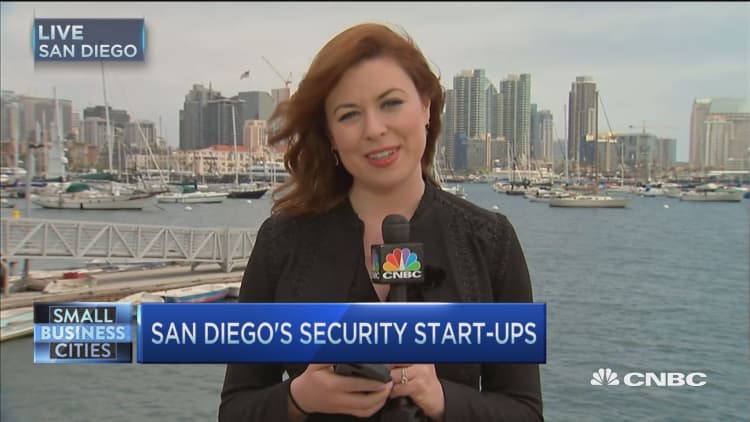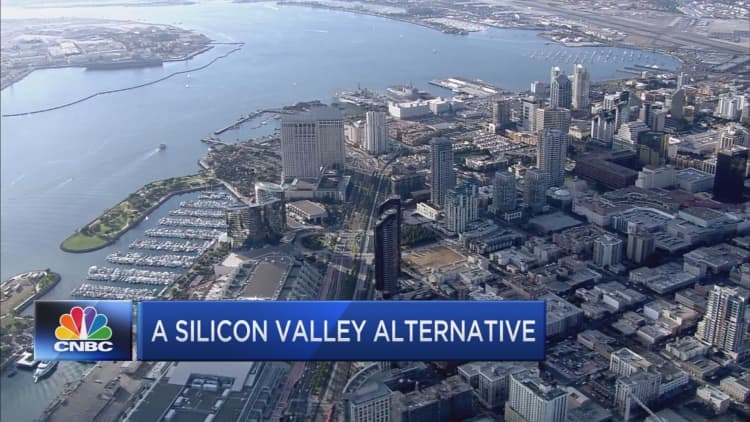
Due in large part to the sky-high valuations of Silicon Valley's technology darlings, San Francisco's start-up scene has been a dominant story line in recent years — and rightfully so. But a powerful ecosystem has emerged in San Diego for entrepreneurs, bolstered by the fact it has developed itself as a center of excellence in biotech and life sciences, mobile technology and aerospace research.
According to data from the Kauffman Foundation's "Startup Activity" report, San Diego ranks as a top 10 start-up city for the past two years, advancing one spot to No. 9 in 2015. Eighty percent of entrepreneurs are considered "opportunity share" in the metro, meaning founders were not previously unemployed before launching, but instead started up as they saw an opportunity in the market. What's more, there are nearly 155 start-ups for every 100,000 residents in the area.
Venture capital money is also flowing to San Diego at a fever pitch, with investments totaling $1.28 billion in 2015. This is the most since 2007, when $1.18 billion was deployed to San Diego companies, according to the National Venture Capital Association (NVCA), led by investments in biotechnology and telecommunications companies.
"We have a culture of entrepreneurship and a collaborative environment that you don't see in a lot of other cities," said Jerry Sanders, president and CEO of the San Diego Regional Chamber of Commerce, who added that about 400 new businesses are launched in the region each year. Sanders credits a strong support system of 27 incubators and accelerators in the city, including those out of the University of California, San Diego, and SPAWAR, the Space and Naval Warfare Systems Command, in part for the development of new businesses.
"There's a misperception that you have to be a start-up company based in Silicon Valley to receive venture funding. That's simply not the case," Bobby Franklin, president and CEO of the NCVA, said in an email statement. "Part of what makes a successful ecosystem is knowing what you're good at and building from there."
Leveraging local talent
One of the biggest lures for start-ups is San Diego's talent pool. A San Diego Regional EDC study showed the city has the second-highest concentration of science and engineering professionals in the United States.
Building on the skill set of San Diego's military community is Darin Andersen, a serial start-up entrepreneur, who launched CyberHive four years ago to create a national professional networking organization for emerging technology. Government cybersecurity is a huge focus, but start-ups have expanded to include the Internet of Things, robotics and more. Since 2012, CyberHive has incubated 167 companies, and start-ups have raised $80 million in follow-on funding.
CyberHive sits inside of The Nest co-working community, along with other specialized incubators — including iHive for Internet of Things companies and xHive for start-ups focusing on things like drones, 3-D printing and robotics.
"What we bring is an amazing digital workforce, a population of young millennials, mid-career and even older people in the workforce who have built technical solutions and products in San Diego — it's where we tackle the hard problems," Andersen said.

One issue for the city is brain drain, with talent fleeing to San Francisco or opting not to launch in San Diego at all. Some are being lured away by the idea of working for big names like Facebook and Google or relocating there as the network of venture capital funding is well established in Silicon Valley.
That's something The Vine is attempting to fix. Irvine, a real estate establishment that's been around for 150 years, partnered with EvoNexus, a tech incubator in 2010, providing free space to generate jobs and start-ups in the city, which led to the launch of The Vine in downtown San Diego in 2012. More than 40 percent of downtown companies are housed there, and in four years 134 companies have raised just over $1 billion in funding.
One of those entrepreneurs is Jeff Winkler, who launched Origin Code Academy in September 2015, out of The Vine. The 12-week program costs about $12,000 and has 100 percent job placement so far. Winkler reaches out to big tech names in the area, like Qualcomm and Microsoft, to ensure he is teaching the skills needed for hiring post-graduation.
"Everyone in San Diego was leaving to go to the Bay Area, so we are just trying to solve the overall problem of keeping talent in San Diego," said Winkler, who previously worked in finance before selling a fitness app, Gymsurfing, to the company that was later bought by ClassPass. He had first attended a coding class in Orlando. "I didn't have the best experience, and no one got a job once the course was over," he said — something he is aiming to fix with his own model.
Another Vine graduate is TapHunter, a craft beer platform helping other small businesses. The industry tool has raised just over $1 million in funding and helps bar and restaurant owners automatically update their inventory on social, web, menus and displays on the platform. The company's consumer-facing app also helps users find the places that are selling and serving their favorite drinks.
Craft brewing has been a growing industry in the city over the past several decades, and husband-wife duo Flash and Melani Gordon saw an opportunity. "It's local, and it's quality," Melani said of the craft brew movement. "Running a world-class beverage program is not easy, and that's what our tools help you to do."
"Craft beer is a premium local product, and there is a real passion for it in San Diego," Flash added. "And I felt that here."




